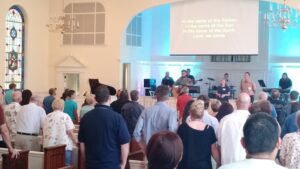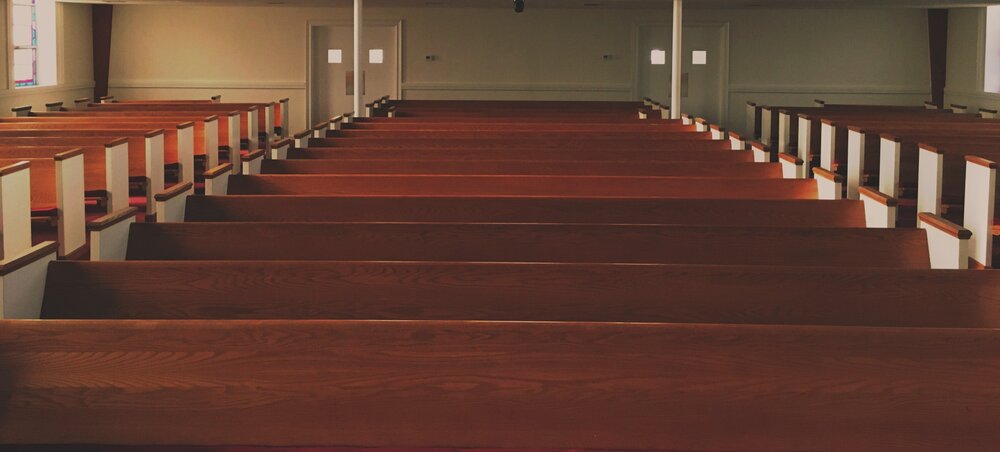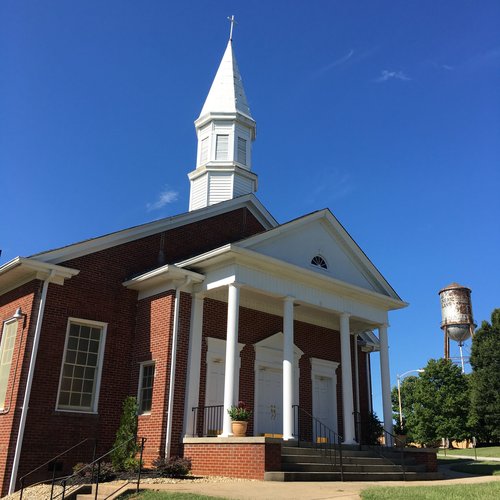What Is Restarting?
Sans Souci Baptist Church turned 92 in 2018. Like many churches it is a church that has seen great heights, particularly in the 1960s and 70s when it was one of the largest churches in Greenville, South Carolina, but it had experienced a significant decline over the past decade.
Sans Souci is located in a community by the same name, an historic community in the shadow of a growing downtown Greenville. The community around the church building has transitioned from a post-World War II working class mill village to a racially and socioeconomically diverse community. The closing of the textile mills that once created an economic downturn is now beginning to see new life as Greenville area residents seek affordable housing and a neighborhood community to call home.
The congregation worshipping at Sans Souci Baptist dwindled to less than 40 with members from seven zip codes and very few members from within the community. The church was also without a senior pastor and would not be able to afford to hire a full-time pastor. Their facilities were under-utilized and maintenance and repair had been deferred due to limited finances. Facing the challenges of revitalization or possible closure, the membership committed to reSTARTing the church with a new vision to proclaim Christ to the community.
Sans Souci Church is now “restoring lives and transforming community” for generations to come. The congregation at this former mill village church now reflects the changing community around it with new families, diversity and a hope for future generations of disciples to worship and proclaim Christ in their community.

What is reSTART?
reSTART is a strategic initiative to start a new church in the fertile soil of the remaining resources of a dying church. It is a complete reSTART that shepherds a remaining congregation while beginning new contextualized ministries under new leadership, vision and organizational structure. The remaining families, facilities, and finances are invested forward in partnership with a trained church planter and team, so that the neighboring community can discover the hope of Jesus Christ for generations to come.
Whereas church revitalization utilizes current leadership and organization to cast a new vision and strengthen ministries in a struggling church, a reSTART initiative launches a new work in an established location providing a new start for a dying church.
Why Should a Church reSTART?
Several motivations may encourage a congregation to reSTART.
Several motivations may encourage a congregation to reSTART.
- reSTARTing maintains a gospel presence in the community.
- reSTARTing effectively shepherds the remaining flockof a dwindling congregation.
- reSTARTing demonstrates good stewardshipof congregational resources such as property, facilities and any remaining assets entrusted for ministry.
- reSTARTing demonstrates many of the attributes of our God who is “making all things new” for His glory (Rev. 21:5).
What are reSTART essentials?

Through our partnerships and past success stories we have discovered the following essentials for an effective reSTART:
- New Church – ReSTARTing creates a new congregation when an existing church intentionally dissolves so that a new congregation can worship in an established facility.
- New Leadership – ReSTARTing utilizes trained church planters and interim pastors to provide a new vision and leadership.
- New Organizational Structure – Successful ReSTARTing requires a higher degree of flexibility and simplicity. This often includes (1) drafting new by-laws and constitution to facilitate the vision, (2) establishing a new leadership structure to implement the vision, and (3) new financial guidelines to support the vision.
- New Ministries – reSTARTing launches new ministries to make disciples in communities that have often undergone significant transition. Just as a missionary develops contextual strategies to proclaim Christ, a reSTART church must build new ministries to reach their communities.
- New Partnerships – reSTART churches need support of healthy partnerships from other congregations and organizations. These partnerships can assist through financial support, volunteers, material resources for ministry and more. Many times reSTART congregations are adopted by a sponsoring church or churches creating a collaborative relationship for several years until the reSTARTing church is self-sustaining.
- New Name – Launching a reSTART under a new name communicates a new work and vision for ministry to the community. Changing the name of the congregation provides the ability to continue the founding vision under a new identity with a clear separation from the past challenges that led to the need for reSTARTing.
When is reSTARTing a good option?
The decision to reSTART is not an easy decision, but there are a few ways to determine if a church is a good candidate for a reSTART consultation:
- If the church continues its current trend, it will close its doors in a few years.
- The church is without pastoral leadership. They may have an interim, or someone providing pulpit supply. A retiring pastor could also be instrumental in guiding a restart consultation.
- The church is not laden with financial debt from previous building programs or poor stewardship.
- The church facilities are in good condition and have been well maintained.
- The remaining congregation is willing to do whatever it takes for future worshippers to thrive in the community.

How do I know if reSTARTing is an option for my church?
reSTARTing is one of several options for churches at-risk of future decline. Your first next step to determine if reSTARTing is the best option begins with completing a short, online questionnaire to initiate a conversation with your South Carolina Baptist Convention team. Click HERE to begin the questionnaire. Or you may email our team at HopeForChurches@scbaptist.org.


